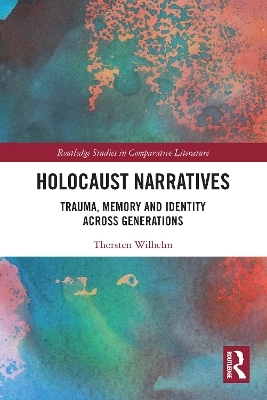
Holocaust Narratives
Routledge (Verlag)
978-0-367-54088-3 (ISBN)
Holocaust Narratives: Trauma, Memory and Identity Across Generations analyzes individual multi-generational frameworks of Holocaust trauma to answer one essential question: How do these narratives change to not only transmit the trauma of the Holocaust – and in the process add meaning to what is inherently an event that annihilates meaning – but also construct the trauma as a connector to a past that needs to be continued in the present? Meaningless or not, unspeakable or not, unknowable or not, the trauma, in all its impossibilities and intractabilities, spawns literary and scholarly engagement on a large scale. Narrative is the key connector that structures trauma for both individual and collective.
Thorsten Wilhelm studied History and English Literature and Linguistics at the University of Heidelberg and the University of Durham. He received his Staatsexamen (M.A.) in 2014. In 2019, Thorsten was awarded his Ph.D. summa cum laude by the English Department at Heidelberg University for his dissertation on "Traumatic Memories—Memories of Trauma: Post-1945 Jewish American Fiction and the Cultural Work of Trauma Narratives." Thorsten’s work comprises trauma theory and cultural productions at the interstices of trauma, memory, and narrative. Apart from his work on contemporary literature and its diverse traumata, Thorsten is fascinated by the 19th century. He lives his euphoria for Charles Dickens by working on a digitization project of rare and unique archival materials at the Beinecke Rare Book and Manuscript Library at Yale University. He has been a Curatorial Fellow at the Beinecke in 2018. Thorsten has been a Baden-Württemberg Lector at Yale University since 2016. He teaches German language, culture, and writing, and is interested in pedagogy with a focus on cultural learning and the production of cultural perceptions. He is a peer-reviewer for Die Unterrichtspraxis/Teaching German and book-reviewer for CALICO.
Introduction:
Holocaust traumata and their generational legacies and emanations
Generations: structural frameworks
The dialogical nature of (collective) trauma
Trauma theory: concepts, implications, outlooks
Moving trauma theory into the generation of postmemory
Living in the aftermath: forms of trauma
Insterstices between individual and cultural trauma
Trauma as connective force
Structure of the book
Narrating the inexpressible: Wiesel’s Night as testimonial trendsetter
God on the gallows: doublings of faith
Trauma in the mirror: identities in the face of trauma
Paradigmatic accuser: connecting audiences
Witness in search of meaning and silence
Surviving and remembering: representing trauma in the present
The truth of fiction in Louis Begley’s Wartime Lies
Narrated identities: fictionalization of self and its actual facts
Negotiating fact and fiction in meaningful representation for the audience
The creation of meaning and its passing ownership
(R/De-)construction of narrative and real identity
Asserting control by narrative means
Rescuing one’s memory from past traumata: Cheryl Pearl Sucher’s The Rescue of Memory
Past and Present: making a stance of one’s own
Photographs and other stories: past negatives and healing trauma
Generational Connections: approaching first- and second-generation trauma
First-hand trauma in second-generation writing
Emancipation through embedding: establishing a meaningful presence of the past
Meaningful incorporation of past trauma into present narratives
Encaustic memories: Second-generation assertions in Rosenbaum’s Second Hand Smoke
Traumatic impositions: connecting first- and second-generation trauma
Encountering the ghosts: generational connections to the past
Close contact: breaking down past and present distinctions
Imposing trauma: between filial rage and generational forgiveness
Individual and cultural authorship over trauma stories
Damaged goods: navigating parental trauma and one’s own
Exclusion from and inclusion into parental narratives
Remembering, letting go, and incorporating the past into the present
Progressive and tragic narrative outlook in overcoming trauma
Connecting worlds: Narrative networks in Horn’s The World to Come
Generational temporal connections
Choosing narrative, choosing life
Linguistic connections to translated pasts
Storied bridges: connecting present, past, and future worlds
Meaningful narratives: paper bridges between (past) trauma and (present) meanings
Connecting worlds: people as stories
Creating a future from the past
Stories as narrative intersections between generations
When memory fails: Fiction as history in Everything Is Illuminated
Narrative trajectories: limitations of fictional meaning creation
Generational positions: midrashic engagements and circular historicity
(Re-)Constructing the past: interrelations between the place and its stories
Language and silence: connective phantasmagorias of meaning
Workable terminologies: integrating past-tensed facts
Fictional records: tracking meanings between past and present
Narrative realities: permeating events and stories
Imaginative representation: memory’s narrative dependencies
Generational catharsis in dyadic, generational encounters
Conclusion: The future of trauma
| Erscheinungsdatum | 20.07.2023 |
|---|---|
| Reihe/Serie | Routledge Studies in Comparative Literature |
| Verlagsort | London |
| Sprache | englisch |
| Maße | 152 x 229 mm |
| Gewicht | 453 g |
| Themenwelt | Geschichte ► Allgemeine Geschichte ► Neuzeit (bis 1918) |
| Geschichte ► Allgemeine Geschichte ► 1918 bis 1945 | |
| Geisteswissenschaften ► Sprach- / Literaturwissenschaft ► Anglistik / Amerikanistik | |
| Geisteswissenschaften ► Sprach- / Literaturwissenschaft ► Literaturwissenschaft | |
| Medizin / Pharmazie ► Medizinische Fachgebiete ► Notfallmedizin | |
| Medizin / Pharmazie ► Medizinische Fachgebiete ► Psychiatrie / Psychotherapie | |
| ISBN-10 | 0-367-54088-6 / 0367540886 |
| ISBN-13 | 978-0-367-54088-3 / 9780367540883 |
| Zustand | Neuware |
| Haben Sie eine Frage zum Produkt? |
aus dem Bereich


